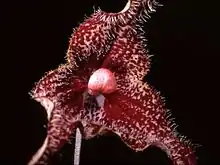Dracula
See also: Drácula
Translingual
Etymology
Medieval Latin or later, draco (“serpent, dragon”) -ula (“diminutive”)
Hypernyms
- (genus): Eukaryota - superkingdom; Plantae - kingdom; Viridiplantae - subkingdom; Streptophyta - infrakingdom; Embryophyta - superphylum; Tracheophyta - phylum; Spermatophytina - subphylum; angiosperms, monocots - clades; Asparagales - order; Orchidaceae - family
Hyponyms
- (genus): Dracula chimaera - type species; Dracula subg. Dracula, Dracula subg. Sodiroa, Dracula subg. Xenosia (subgenera)
- For a list of the numerous species, see


- For a list of the numerous species, see
References



- Dracula at Encyclopedia of Life
- Dracula at National Center for Biotechnology Information
English
Etymology
From the name Vlad III Dracula (also known as Vlad Țepeș), from the name of his father Vlad II Dracul, who was given the name Dracul by the Order of the Dragon. Dracul comes from the Romanian drac (“devil”), itself deriving from the Latin draco (“dragon”).
Pronunciation
- IPA(key): /ˈdɹækjʊlə/, /ˈdɹækjələ/
Proper noun
Dracula
- The fictional vampire in the novel of the same name by Bram Stoker.
- A former prince of Wallachia.
Synonyms
Translations
fictional vampire
former prince of Wallachia
|
|
See also
Anagrams
This article is issued from Wiktionary. The text is licensed under Creative Commons - Attribution - Sharealike. Additional terms may apply for the media files.
